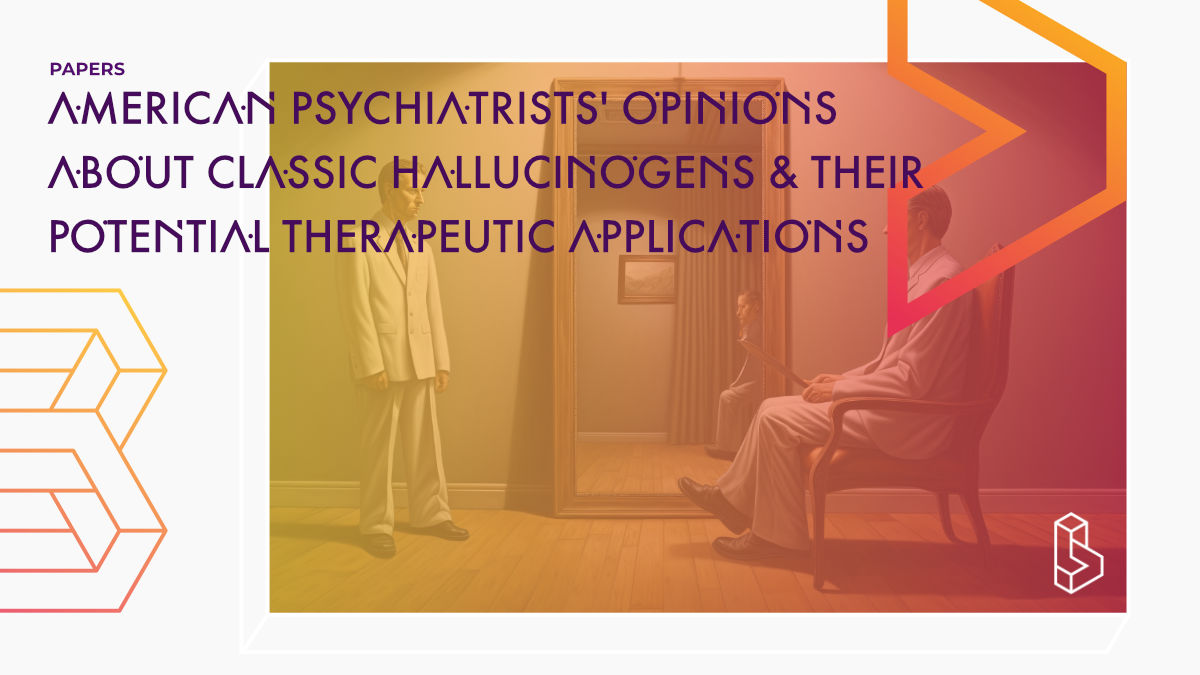This survey (n=131) conducted among American psychiatrists aimed to assess their opinions about psychedelics & PAT in 2023, comparing the results with a similar study conducted in 2016. The findings revealed a significant positive shift in attitudes among American psychiatrists since 2016, with a majority expressing moderate to strong belief in the therapeutic potential of psychedelics for treating psychiatric conditions (81%) and substance use disorders (61%).
Abstract of American Psychiatrists’ Opinions About Classic Hallucinogens and Their Potential Therapeutic Applications: A 7-Year Follow-Up Survey
“Background: Psilocybin, a classic hallucinogen, may eventually be approved by the United States Food and Drug Administration for treatment-resistant depression. However, we are aware of only one published national survey of American psychiatrists regarding their opinions about hallucinogens and hallucinogen-assisted therapy, conducted by our group in 2016. Here, we report a repeat survey, using virtually identical methods, assessing whether American psychiatrists display greater optimism about the therapeutic use of hallucinogens in 2022–23.
Methods: We e-mailed our survey instrument to 1,000 randomly selected American Psychiatric Association members—250 resident-fellows and 750 attending psychiatrists—in late 2022 and early 2023. We calculated descriptive statistics and used a non-parametric trend test to compare the current survey responses with those from 2016. We also constructed a multivariate logistic regression model to assess attributes of respondents that predicted moderate/strong agreement with plans to incorporate hallucinogen-assisted therapy into their own practice.
Results: The response rate was 13.1% (N = 131). Respondents were demographically similar to the 2016 respondents. A majority moderately/strongly believed that hallucinogens show promise in treating psychiatric conditions (80.9%) and substance use disorders (SUDs) (60.8%). Large majorities also moderately/strongly supported research into hallucinogens’ therapeutic potential for psychiatric conditions (93.9%) and SUDs (88.6%), as well as federal funding of associated clinical trials (84.7% and 80.9%, respectively). Comparisons to 2016 showed significantly increased optimism regarding the therapeutic promise of hallucinogens and decreased concern about risks, with 50.4% of respondents reporting moderate/strong intentions to incorporate hallucinogen-assisted therapy into their practice.
Conclusions: Our data reveal a striking positive shift in attitudes toward the therapeutic potential of hallucinogens among American psychiatrists since 2016, with a majority of responding psychiatrists planning to incorporate hallucinogen-assisted therapy into their practice if regulatory approval is granted.”
Authors: Brian S. Barnett, Miranda Arakelian, David Beebe, Jared Ontko, Connor Riegal, Willie O. Siu, Jeremy Weleff & Harrison G. Pope
Summary of American Psychiatrists’ Opinions About Classic Hallucinogens and Their Potential Therapeutic Applications: A 7-Year Follow-Up Survey
Classic hallucinogens such as psilocybin, LSD, and mescaline exert their psychoactive effects via 5-HT2A receptor agonism. Despite accelerating research into therapeutic applications, data are limited on American psychiatrists’ current attitudes regarding these drugs.
In 2016, 65% of American psychiatrists moderately/strongly agreed that classic hallucinogens increase the risk for subsequent psychiatric disorders, and 48% moderately/strongly agreed that classic hallucinogens increase the risk for long-term cognitive impairment. Fewer than half agreed that classic hallucinogens show promise in treating psychiatric disorders.
The authors conducted a repeat national survey of American psychiatrists’ opinions about classic hallucinogens, and hypothesized that respondents would be more optimistic about their therapeutic potential and less concerned about their risks.
Find this paper
https://doi.org/10.1089/psymed.2023.0036
Paywall | Google Scholar | Backup | 🕊
Cite this paper (APA)
Barnett, B. S., Arakelian, M., Beebe, D., Ontko, J., Riegal, C., Siu, W. O., ... & Pope, H. G. (2023). American Psychiatrists' Opinions About Classic Hallucinogens and Their Potential Therapeutic Applications: A 7-Year Follow-Up Survey. Psychedelic Medicine.
Study details
Topics studied
Population Surveys
Study characteristics
Longitudinal
Survey
Participants
121
Humans

